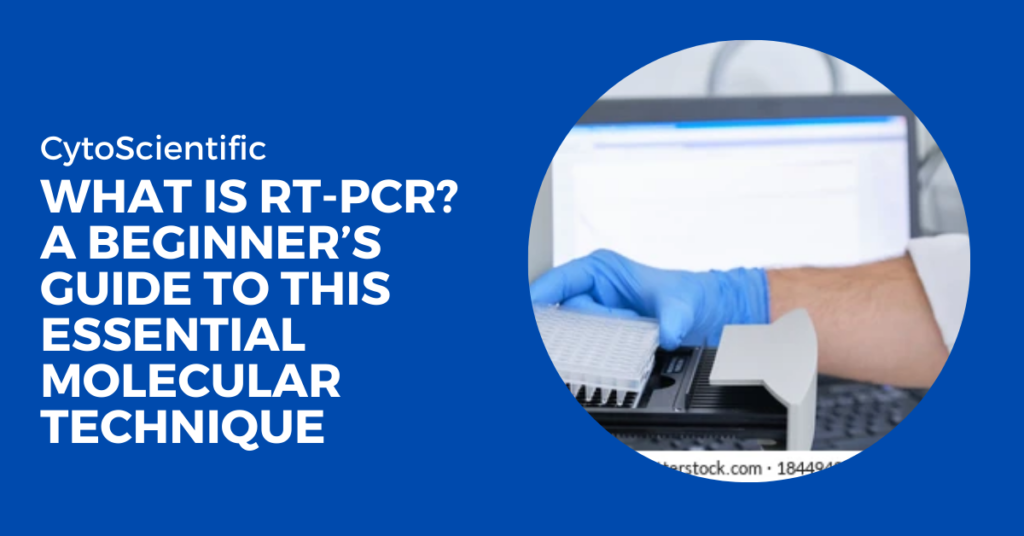Reverse Transcription Polymerase Chain Reaction (RT-PCR) is a powerful molecular biology tool widely used for detecting and quantifying RNA. This technique has gained immense popularity in research, clinical diagnostics, and beyond. Let’s explore its principles, applications, and significance in modern science.
What is RT-PCR?
Reverse Transcription Polymerase Chain Reaction, or RT-PCR, is a method used to analyze RNA in the laboratory. This technique merges two steps: reverse transcription and PCR. Initially, RNA is transformed into complementary DNA (cDNA) with the help of an enzyme known as reverse transcriptase. Following this, the cDNA is amplified using PCR, producing multiple copies for further examination. RT-PCR is a powerful tool for studying RNA and its functions.
RT-PCR is widely used in research and diagnostics, including detecting RNA viruses, measuring gene expression, and studying genetic mutations. Its ability to amplify and analyze small amounts of RNA makes it a valuable tool in molecular biology.
How Does RT-PCR Work?
RT-PCR combines two main processes: reverse transcription and polymerase chain reaction (PCR). It starts with extracting RNA from samples like cells, tissues, or viral particles. The RNA acts as a template for reverse transcription, where an enzyme called reverse transcriptase converts it into complementary DNA (cDNA). This cDNA is then amplified in the PCR process using specific primers targeting the desired sequence and a DNA polymerase enzyme. The amplification occurs in a thermal cycler, which alternates between heating and cooling to allow DNA denaturation, primer annealing, and strand extension. Detection of the amplified DNA is achieved using fluorescent dyes or probes, enabling real-time monitoring of the process. By combining these steps, RT-PCR provides high sensitivity and specificity, making it a powerful technique for analyzing RNA. It is widely used in diagnostics, such as detecting RNA viruses, and in research to study gene expression and molecular mechanisms.
Applications of RT-PCR
Disease Diagnosis
RT-PCR is commonly used to detect RNA viruses like SARS-CoV-2, ensuring accurate and sensitive diagnostics.Gene Expression Studies
Scientists analyze how genes are turned on or off in different conditions, helping in understanding cellular functions and disease mechanisms.Cancer Research
Detecting tumor-specific RNA biomarkers aids in early cancer diagnosis and monitoring treatment effectiveness.Pharmaceutical Development
RT-PCR helps evaluate the efficency of drugs by assessing their impact on gene expression.
Advantages of RT-PCR
- High Sensitivity: Can detect minute amounts of RNA.
- Specificity: Designed to target specific RNA sequences.
- Speed: Delivers results within hours.
- Versatility: Suitable for various biological and clinical sample types.
Challenges in RT-PCR
While RT-PCR is highly efficient, it requires careful handling of RNA to prevent degradation. Contamination and technical errors can lead to inaccurate results, highlighting the need for strict laboratory protocols.
RT-PCR in the COVID-19 Era
The COVID-19 pandemic emphasized the vital importance of RT-PCR worldwide. As the main method for detecting SARS-CoV-2, it was crucial for diagnosing cases, tracking the virus’s transmission, and shaping public health policies. Additionally, the pandemic drove progress in RT-PCR technology, leading to faster workflows and the creation of portable devices.
Conclusion
RT-PCR’s ability to detect and quantify RNA with accuracy and speed has made it indispensable in various fields. As technology advances, its applications are expected to grow, contributing to breakthroughs in science and medicine.
For laboratories looking to optimize their RT-PCR workflows, CytoScientific offers high-quality plasticware, including PCR tubes and plates, designed for precision and reliability. Elevate your research with tools you can rely on.
RT-PCR’s precision and efficiency in detecting and quantifying RNA have made it a cornerstone in numerous scientific fields. With ongoing advancements, its applications are poised to expand, driving innovations in science and healthcare.
For laboratories aiming to streamline their RT-PCR processes, CytoScientific provides premium plasticware, such as PCR tubes and plates, engineered for accuracy and dependability. Elevate your research with tools you can rely on.
Would you like to explore more about RT-PCR tools and techniques? Reach out today.

